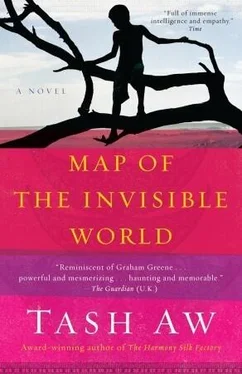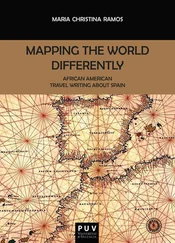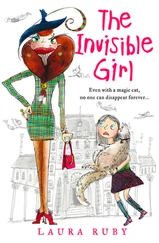1 ...7 8 9 11 12 13 ...83 “What is?”
“Education. You saw those kids at school? What kind of families do you think they come from?”
Horrible ones, Adam wanted to say. Filthy, mean, horrible ones.
“Poor ones. Farmers or fishermen who can’t read or write, and yet everyone has had to pay to get into that school. They take a little money or a carton of cigarettes to the education officer and beg him to put their child’s name on the school list, and if they don’t have cash they take a goat or some chickens or sacks of rice. There isn’t space for everyone, so the kids whose parents pay the most get in. I had to do the same — I paid the most because I’m … well, they look at me and their minds are made up.”
“Because you’re foreign?”
“Because I’m rich. Or at least that’s what they think.”
Adam watched as Karl lifted the bicycle and set it upright; its handlebar and pedal were covered thickly with sand that fell to the ground in clumps. “The point is,” Karl continued, “none of those people can afford to send their children to school. They’d rather have their kids with them, working in the fields or out at sea with them. Then they have to pay for uniforms, shoes, books. Why? Because they want their children to read and write, to have nice jobs in offices and drive cars in Jakarta. They might not realize it, but they believe in the future of this country.”
The next day he sent Adam back to school again.
The teacher taught them simple grammar and rudimentary arithmetic. She made them practice the letters of the alphabet and introduced them to new words, writing them out on the blackboard in short sentences that no one but Adam could make sense of. It did not seem to matter to her that almost everyone in the class was asleep or staring red-eyed out the window at the grassy plains pockmarked with blackened heaps of half-burned rubbish, where skinny goats picked through the piles of waste, dragging plastic bags out of the cinders. CITIZEN. REPUBLIC. PRESIDENT. REVOLUTION. WESTERN IMPERIALISTS. I am a citizen of the Republic of Indonesia. The president of the Republic of Indonesia is President Sukarno. President Sukarno led the revolution against the Western Imperialists who destroyed …
“It’s hot,” someone whispered, “I have to go home.” Adam turned around and saw the girl with the birthmark slumped on her desk, twirling a dry strip of coconut leaf in her fingers. She brushed the leaf lazily against Adam’s back. “Are your parents expecting you home too?”
Adam nodded. Close up, he could see that the discolored patch of skin on her face was not a birthmark but a scar, an inky mass of tissue that looked almost smooth, like a pebble on the riverbank, crisscrossed by long-dead veins. She was a few years older than Adam but no taller; her fingernails were dirty and worn.
“Actually, I only have a mother at the moment,” she said.
“At the moment?”
“Yeah, my father’s in jail. Don’t know when he’ll be out. I’m an orphan! That’s what my mother says when she gets in a mood and starts crying. ‘I am a widow! I am nothing! My daughter is an orphan! Oh, my daughter is an orphan!’”
Adam giggled. She was much darker than he was, yet she did not seem entirely like the other kids; she spoke with a different accent too.
“My name’s Neng. What’s yours?” She tickled his neck with the leaf.
“Adam.”
“I have to go and collect this month’s rice from the district office later. Want to come with me? It’s not a long walk. Besides, you have a bicycle….” Her smile showed off two gaps in her teeth.
“Umm, I don’t know. My father will be worried if I don’t come home.”
“Come on, it won’t take long.” She reached out and brushed the leaf softly across his cheek, giggling as she did so. “I know a shortcut back to where you live.”
By the time they left school the sky had dulled slightly with patches of silver blue cloud, and it was no longer oppressively hot; the sea breeze had picked up, signaling the possibility of the sudden sharp showers for which Perdo is famous. Adam and Neng had just reached the end of the path that led to the main road when they saw a group of boys from school waiting for them, squatting at the edge of the broken tarmac in the shade of a sea almond sapling.
“Hi, friend,” one of them said, standing up. He had taken his shirt off and tied its arms around his forehead so that it fell down his back like the headdresses of Arab sheikhs that Adam had seen in books. This boy was bigger than the others, and when he spoke his voice cracked, alternating between a child’s high-pitched squeak and a manly croak. “This is the little orphan who lives with that European man. You’re his servant, yeah?”
“No,” Adam said, “he’s my father.”
The older boy threw back his head and laughed. There was a circle of dried-up spittle around his lips. Behind him Adam noticed that one of the other boys was playing with a dead bird, stretching its red and black wings across the sand as if willing it to fly. “Yeah, yeah. You lick the shit from his toilet.” He pushed his fingers into Adam’s collarbone with a rough, jabbing motion, making Adam lose his balance; his bicycle fell from his grip and dropped to the ground. The other boys laughed. “What a weakling,” the gang leader said.
Adam tried to pick himself up but found that his legs had turned to jelly; his face felt hot and he could not speak. Pressure filled his head, and he felt like vomiting. His ears filled with a great rushing noise, the kind you might hear if you are standing on the seashore before a violent storm, when the froth of the waves blanks out all other noise and makes you lose all notion of where you are. He lay on the ground, kicking feebly at the coppery leaves of the sea almond that lay scattered on the ground. The people standing over him seemed blurred, wobbling as though shaken by gusts of wind. He began to shiver.
I am just like everyone else I am just like please I am just
“Anyway,” he could hear the man-boy’s croaky voice, “whatever the white man is to you, he’s rich. He can buy you another bicycle. This one’s nice.” Adam saw feet moving around him and heard the chain of his bicycle ticking. Someone tugged the strap of his satchel, which came away from his body as if it no longer wanted to belong to him.
“Stop!” Neng shouted. She put her hands under Adam’s armpits and hauled him into a sitting position. “This is not fair. Leave the bike or I’ll kick your balls.”
“Oh-oh, look who’s talking,” the croaky voice said. “What you going to do, help this weakling? Look how tiny he is! Look at those little fat legs. He’s not worth getting beaten up over. Right, boys?” The voice was steadier now, threatening.
“At least he can read and write. You’re nearly an adult and you still can’t read.” Neng was trying to yank Adam into a standing position but Adam’s legs were still weak.
“You just want the bike for yourself, that right?” The man-boy took a step toward Neng; he looked nearly twice as big as she was.
“Just leave him alone.”
The boy raised his hand and hesitated a second before slapping Neng hard. “You’re just a dirty foreigner too,” he said. “Look at you, a dirty monster.” Neng stood blinking at him, as if she had not been struck.
“Careful, Yon,” a smaller boy said in a quiet voice. “She’s Madurese. You know what they’re like.”
“I don’t care,” the boy croaked. “These bloody foreigners, they come here and all they do is cause trouble, taking our land. They’re going to chase us off our own island soon, there’ll be nothing left for us. There’ll be more of them than us! That’s what my dad says. He’s fed up with them. Need to teach them a lesson from time to time, he says.”
Читать дальше
Конец ознакомительного отрывка
Купить книгу












